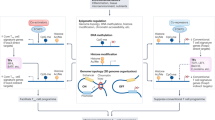Abstract
Introduction
A number of studies have suggested that transforming growth factor beta (TGF-β) plays a critical role in immune suppression mediated by Foxp3+ regulatory T cells. TGF-β in concert with interleukin 2 is a potent induction factor for the differentiation of Foxp3+ Treg from naive precursors. Polyclonal TGF-β-induced Treg (iTreg) are capable of preventing the autoimmune syndrome that develops in scurfy mice that lack Foxp3+ Treg. Antigen-specific iTreg can be used to both prevent and treat autoimmune gastritis that is induced by transfer of naive or primed autoantigen-specific T cells. TGF-β complexed with latency-associated peptide is expressed on the surface of activated thymus-derived Treg. Coculture of activated Treg with naive responder T cells results in the de novo generation of fully functional Foxp3+ T cells in a contact-dependent and TGF-β-dependent manner.
Conclusions and Speculations
Generation of functional Foxp3+ T cells via this pathway may represent a mechanism by which Treg maintain tolerance and expand their repertoire.




Similar content being viewed by others
References
Nakamura K, Kitani A, Strober W. Cell contact-dependent immunosuppression by CD4+CD25+ regulatory T cells is mediated by cell surface-bound transforming growth factor β. J Exp Med. 2001;194:629–44.
Piccirillo CA, Letterio JJ, Thornton AM, et al. CD4+CD25+ regulatory T cells can mediate suppressor function in the absence of transforming growth factor β1 production and responsiveness. J Exp Med. 2002;196:237–45.
Mamura M, Lee W, Sullivan TJ, et al. CD28 disruption exacerbates inflammation in Tgf-β−/− mice: in vivo suppression by CD4+CD25+ regulatory T cells independent of autocrine TGF-β1. Blood 2004;103:4594–601.
Powrie F, Carlino J, Leach MW, et al. A critical role for transforming growth factor-beta but not interleukin 4 in suppression of T helper type-1 mediated colitis by CD45RBlow CD4+ T cells. J Exp Med. 1996;183:2669–74.
Chen ML, Pittet MJ, Gorelik L, et al. Regulatory T cells suppress tumor-specific CD8 T cell cytotoxicity through TGF-β signals in vivo. Proc Natl Acad Sci USA. 2005;102:419–24.
Green EA, Gorelik L, McGregor CM, et al. CD4+CD25+ T regulatory cells control anti-islet CD8+ T cells through TGF-β–TGF-β receptor interactions in type 1 diabetes. Proc Natl Acad Sci USA. 2003;100:10878–83.
Nakamura K, Kitani A, Fuss I, et al. TGF-β1 plays an important role in the mechanism of CD4+CD25+ regulatory T cell activity in both humans and mice. J Immunol. 2004;172:834–42.
Kullberg M, Hay V, Cheever AW, et al. TGF-β1 production by CD4+CD25+ regulatory T cells is not essential for suppression of intestinal inflammation. Eur J Immunol. 2005;35:2886–95.
Marie JC, Letterio JJ, Gavin M, et al. TGF-β1 maintains suppressor function and Foxp3 expression in CD4+CD25+ regulatory T cells. J Exp Med. 2005;201:1061–7.
Fahlen L, Read S, Gorelik L, et al. T cells that cannot respond to TGF-β escape control by CD4+CD25+ regulatory T cells. J Exp Med. 2005;201:737–46.
Peng Y, Laouar Y, Li MO, et al. TGF-β regulates in vivo expansion of Foxp3-expressing CD4+CD25+ regulatory T cells responsible for protection against diabetes. Proc Natl Acad Sci USA. 2004;101:4572–7.
Marie JC, Liggitt D, Rudensky YA. Cellular mechanisms of fatal early-onset autoimmunity in mice with T cell-specific targeting of transforming growth factor-β receptor. Immunity 2006;25:441–54.
Chen W, Jin W, Hardegen N, et al. Conversion of peripheral CD4+CD25− naïve T cells to CD4+CD25+ regulatory T cells by TGF-β induction of transcription factor Foxp3. J Exp Med. 2003;198:1875–86.
Davidson TS, DiPaolo RJ, Andersson J, et al. Cutting edge: IL-2 is essential for TGF-β-mediated induction of Foxp3+ T regulatory cells. J Immunol. 2007;178:4022–6.
Huter EN, Punkosdy GA, Glass DD, et al. TGF-β-induced Foxp3+ regulatory T cells rescue scurfy mice. Eur J Immunol. 2008;38: In Press.
DiPaolo RJ, Brinster C, Davidson TS, et al. Autoantigen-specific TGFβ-induced Foxp3+ regulatory T cells prevent autoimmunity by inhibiting dendritic cells from activating autoreactive T cells. J Immunol. 2007;179:4685–93.
Li MO, Wan YY, Flavell RA. T cell-produced transforming growth factor-β1 controls T cell tolerance and regulates Th1- and Th17-cell differentiation. Immunity 2007;26:1–13.
Pesu M, Watford, WT, Wei L, et al. T cell-expressed proprotein convertase furin is essential for maintenance of peripheral tolerance. Nature. 2008; in press.
Qin S, Cobbold SP, Pope H, et al. “Infectious” transplantation tolerance. Science 1993;259:974–7.
Andersson J, Tran DQ, Pesu M, et al. CD4+CD25+ regulatory T cells confer infectious tolerance in a TGF-β-dependent manner. J Exp Med. 2008; in press.
Tran DQ, Ramsey H, Shevach EM. Induction of FOXP3 expression in naïve human CD4+FOXP3 T cells by T-cell receptor stimulation is transforming growth factor-beta dependent but does not confer a regulatory phenotype. Blood 2007;110:2983–90.
Daley SR, Ma J, Adams E, et al. A key role for TGF-β signalling to T cells in the long-term acceptance of allografts. J Immunol. 2007;179:3648–54.
Author information
Authors and Affiliations
Corresponding author
Rights and permissions
About this article
Cite this article
Shevach, E.M., Davidson, T.S., Huter, E.N. et al. Role of TGF-β in the Induction of Foxp3 Expression and T Regulatory Cell Function. J Clin Immunol 28, 640–646 (2008). https://doi.org/10.1007/s10875-008-9240-1
Received:
Accepted:
Published:
Issue Date:
DOI: https://doi.org/10.1007/s10875-008-9240-1




